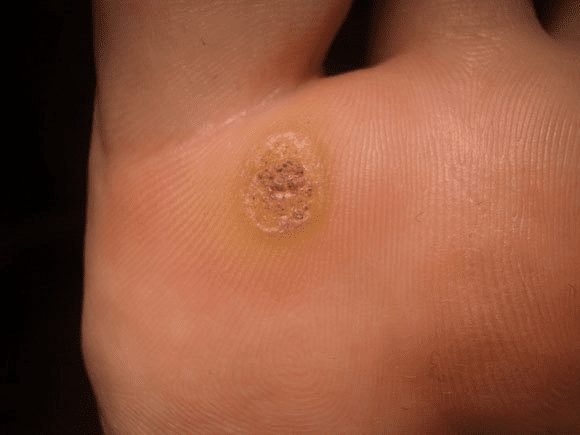Verrucae Pedis (Plantar Warts)
Plantar Warts are painful lesions that present on the bottom of the foot and are caused by the Human Papilloma Virus (HPV). Warts can be extremely painful if not treated properly.
How to identify a wart:
The skin lines (just like fingerprints we have skin lines on our feet too) go around the lesion, not through it. This makes it a foreign body in the skin. They hurt when squeezed more than direct pressure.
When they grow, they have a ‘cauliflower’ like appearance as shown in the photograph

How do we contract the virus?
The virus is contagious through direct person-to-person contact or surface contact, particularly in wet areas, e.g. public swimming pools.
You are more likely to contract the virus when your immune system is down, e.g. if you have just had a cold or are under a lot of stress or anxiety in work or personal life.
In the clinic, it is common for us to see an influx of wart clients in the clinic in mid-summer when everyone has gotten out and started going to public swimming areas or wearing bare feet. As well as this, we see cases come through in winter when everyone’s immune systems are down and suffering from colds.
Prevention:
- Wearing shower shoes in public showers or holiday accommodation, or if a member of your household has a wart
- Cleaning your shower/bathroom floors with bleach or vinegar
- Maintaining a healthy immune system, getting enough sleep, and managing stress and anxiety levels
Treatment options for Plantar Warts :
Debridement by a trained podiatrist can reduce the depth of the wart. Warts tend to have blood vessels that grow through them creating a nutrient source. These may bleed during debridement and generally don’t hurt when this occurs. It is actually a good thing to bleed during debridement as it wake’s up the body’s immune system to recognize there is a problem there to fight back.
Cryofreeze therapy can be used to freeze the core of the wart which causes damage to the cells and over several treatments destruction of the wart.
Salycilic acid aims to cause irritation to the wart tissue and stimulate an immune response and has keratolytic action to assist with mechanical removal of wart tissue.
Silver Nitrate will cauterize the wart tissue. This treatment is generally used in kids as it pain free. In adults with quite large and long standing warts, this isn’t quite as effective, but sometimes used to give the skin a break from salycilic acid.
Home remedies include Thuja or vinegar (pain free, good for kids or can sometimes be used in adjunct to other treatments in adults with stubborn warts)
Boosting your immune system with vitamins and zinc supplements, sufficient sleep, regular meditation to decrease stress also plays a significant role in the prevention and treatment of warts.
Surgical options are available also. A surgeon will assess you if you are an appropriate candidate for surgery, but it’s usually best to try other methods first.
What to expect from treatment:
Repetitive treatments are often necessary- the podiatrist will guide you into an appropriate treatment plan. Coming into the clinic weekly is generally best to tackle stubborn plantar warts. If they are large, well-established warts that have been there for a long time and/or have satellite warts (smaller warts surrounding the main big wart), then you may expect a slower improvement to either the depth or size of the wart.
Treatments can take weeks or months depending on your situation, however, at AC Podiatry we ensure a committed treatment plan to tackle the issue.
Got any questions? Your podiatrist will be happy to help you!
The team at AC Podiatry

